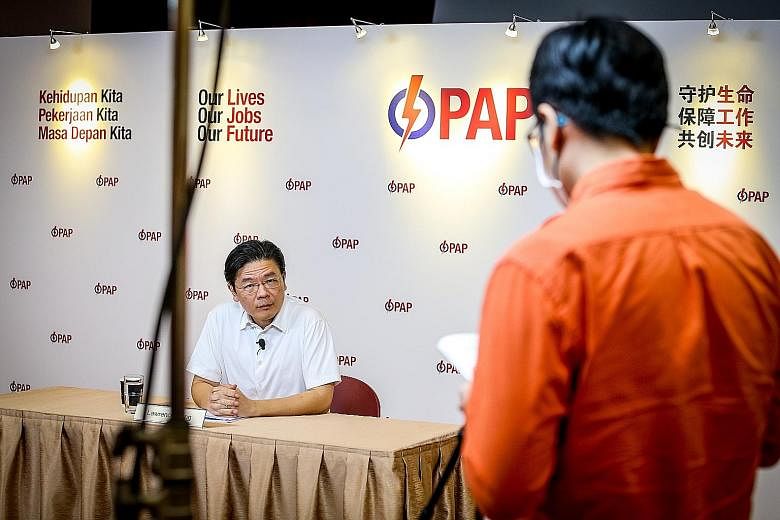- WP's campaign for checks and balances, and emergence of PSP
- Loss of support among young voters and older ones feeling the economic pain
- PAP's online campaign did not connect well with voters
- Support fell among those who live in private property, though not uniformly across estates
The fall in support for the ruling party was not solely among younger voters, but also among other groups such as workers in their 40s and 50s who were feeling the pain caused by the pandemic, said National Development Minister Lawrence Wong yesterday.
These older voters had swung to the opposition primarily because they had suffered income or job losses, had their businesses disrupted, or were forced to downsize to lower-paying jobs, he said.
He said it was not the case that the young had abandoned the PAP nationally, as there were many polling districts and constituencies with such voters where the party received good support, like in Punggol West where it won 61 per cent of the votes.
Mr Wong, who is in the PAP's central executive committee, was addressing party activists virtually from the PAP headquarters in Bedok, where he summed up the reasons that the ruling party performed worse than expected.
The PAP had hoped to garner 65 per cent of the votes, but received 61.2 per cent instead.
First, the Workers' Party ran a good campaign that spoke to the desire of many voters to have more checks and balances in Parliament, Mr Wong said.
This year also saw the emergence of the Progress Singapore Party, which cut into the PAP's strongholds, especially in the west.
Another contributing factor was that the PAP's online campaign did not connect well with voters, Mr Wong said, adding: "We tried our best. We produced a lot of good content online, but not all of this connected with netizens - especially on newer platforms like Instagram and Telegram where the platforms require different sort of content, say, from a platform like Facebook."
He added: "And as with a normal campaign, the negative messages carry further reach than positive messages, and this is further accentuated on the Internet."
He noted that much of the post-election commentary has focused on younger voters and how they have turned away from the PAP.
But voters in their 20s and 30s made up only a third of the electorate, with first-time voters aged between 21 and 24 making up less than 10 per cent of the vote.
"So the swing against the PAP was not concentrated solely among the young. And it was not just unhappiness about the PAP style of campaigning, or how we talked about race, or Pofma," he said, referring to the Protection from Online Falsehoods and Manipulation Act.
Voters in their 40s and 50s, and perhaps even those in their early 60s, also voted against the PAP because of the "real economic pains" they faced. Many in this sandwiched group are looking after both elderly parents and young children, and faced difficulties even before the pandemic hit.
"But since then, I think the challenges have been exacerbated," said Mr Wong, noting that many schemes rolled out under this year's four Budgets were targeted at helping this group.
"Unfortunately, no amount of help will be enough in a crisis of this magnitude. So, we will continue to review and update our policies, and we will do whatever we can to address your anxieties and pain during this difficult period."
PAP also saw support fall among those who lived in private property, although this was not uniformly the case across all private estates.
Voters in these estates could have felt that they were not sufficiently supported during the crisis, Mr Wong said. "They might be business owners, they might be SME owners, and they would be facing considerable economic difficulties."
At a press conference after his address, he was asked if some of these findings - such as the need to connect better with younger voters and improve the party's online campaign - were new to the PAP.
Both these two issues had been thrown up after the 2011 election, and are a "work in progress", he replied.
Other issues, such as the severe economic difficulties faced by many segments of the population, are brand new, he added.
Although the PAP was aware of these issues, the crisis was of such magnitude that they could not be resolved quickly despite government intervention.
"No matter what kinds of resources that you can mount to help them, it is really very hard to talk about businesses that are facing difficulties, contractors who are unable to work because their workers still need to be cleared in the dormitories," he said.
Mr Wong added: "That's why we knew, going into the election, that this was a challenge, and I think the results have shown that... there are issues arising from this particular segment, and we will have to continue to work hard at thinking about ways we can help this group address the difficulties through this crisis."


